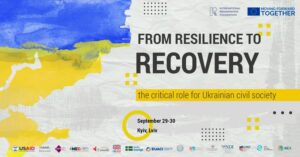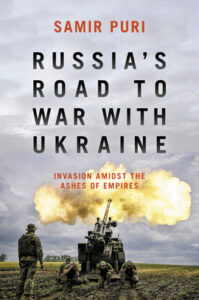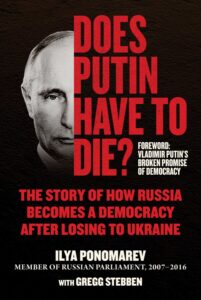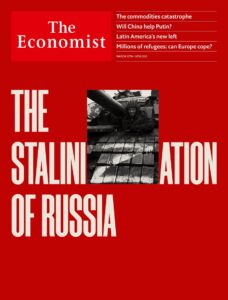“[E]veryone understands that the regime doesn’t have much time left,” says a former Russian intelligence chief.
Many of the Russian cheerleaders of the invasion of Ukraine on Wednesday cast the defense minister’s order to withdraw from Kherson City as a monumental defeat — Moscow’s most devastating, according to one of them, since the fall of the Soviet Union, New York Times Moscow bureau chief Anton Troianovski reports:

Credit: NDI
The announced retreat crystallized the failures of President Vladimir V. Putin’s war effort. It would be a humiliating loss of the largest Ukrainian city that Russia had seized in its nine-month invasion, coming just weeks after Mr. Putin declared it to be an irrevocable part of Russia in a bombastic celebration on Red Square. But analysts who follow Mr. Putin closely saw the order as a reminder of something else: Mr. Putin’s willingness to make tactical concessions in what he sees as a large-scale conflict with the West that, according to people who know him, he believes he can still win.
One pro-Kremlin analyst, Sergei Markov, described the retreat as “Russia’s biggest geopolitical defeat since the moment of the collapse of the U.S.S.R.”
Putin’s invasion of Ukraine has been “a catastrophic strategic disaster,” Colin H. Kahl, the undersecretary of defense for policy, told the Defense Writers’ Group yesterday.
 Officially, however, a Russian defeat remains the only way to end the war that’s acceptable both to Ukraine and the West. What’s left of the Russian political opposition is busy developing a vision for Russia following that defeat, in large part because it perceives a Western demand for such a vision, Bloomberg’s Leonid Bershidsky writes:
Officially, however, a Russian defeat remains the only way to end the war that’s acceptable both to Ukraine and the West. What’s left of the Russian political opposition is busy developing a vision for Russia following that defeat, in large part because it perceives a Western demand for such a vision, Bloomberg’s Leonid Bershidsky writes:
As Gennady Gudkov, a former counterintelligence colonel and legislator who now lives in Bulgaria, put it, “What Western governments and diplomats primarily require of us is a general picture of Russia as it should be after Putin. Because everyone understands that the regime doesn’t have much time left.”
Or as another prominent emigre, London-based former oil tycoon Mikhail Khodorkovsky, explained in an interview, western allies and partners “will have a significant, though not decisive, say in what outcome awaits our country, since regime change will most likely take place as a result of a military defeat.”

Daniel Fried/CEPA
U.S. acceptance of any idea that Ukraine’s international border is negotiable would constitute acceptance of one of Putin’s premises in the war, says the Atlantic Council’s Daniel Fried, the former U.S. ambassador to Poland. Having made such a massive concession at the outset, Putin would hardly respond with grace; rather, he would stand back and demand more. Negotiations would take place on Putin’s terms, with the Biden administration reduced to haggling over the details of its surrender of its friend and its principles, he writes for Just Security.
On Nov. 4-7, a new “Parallel Parliament” for Russia was formed at the “First Congress of People’s Deputies of Russia” in Warsaw. The delegates set themselves the ambitious goal of laying the foundations for a free post-Putin Russia, the Kyiv Post reports.
 The event was hosted by the organizational committee assembled upon the initiative of Ilya Ponomarev, a member of the Russian State Duma from 2007-2016. He was the only member of the Russian Parliament to vote against the annexation of Crimea in 2014. He was forced into exile by Putin shortly afterward but continued to serve in the Duma from outside the country. Ponomarev’s new book is titled “Does Putin Have to Die? The Story of How Russia Becomes a Democracy after Losing to Ukraine”.
The event was hosted by the organizational committee assembled upon the initiative of Ilya Ponomarev, a member of the Russian State Duma from 2007-2016. He was the only member of the Russian Parliament to vote against the annexation of Crimea in 2014. He was forced into exile by Putin shortly afterward but continued to serve in the Duma from outside the country. Ponomarev’s new book is titled “Does Putin Have to Die? The Story of How Russia Becomes a Democracy after Losing to Ukraine”.
In 2015, General Qassem Suleimani, the architect of Iran’s foreign military strategy, travelled to Moscow to see Putin with a pitch—and a plea for Russian intervention. As Russia loses territory, thousands of troops, and massive amounts of weaponry in its war in Ukraine, Iran is now returning the favor, a senior Biden Administration official told me this week, the New Yorker’s Robin Wright observes.
As relations between Moscow and Tehran intensify, Putin’s government is advising the Iranian regime on “best practices” to put down the protests that have swept dozens of cities and more than a hundred university campuses since September 16th, the White House said last week, she adds.
Epic miscalculation
 Putin is an opportunist and an improviser, says former White House Russia expert Andrew S. Weiss. The U.S. withdrawal from Afghanistan in the summer of 2021 convinced him that the Zelenskyy government would crumble if Russia pushed for regime change in Kyiv and that the U.S. and the Europeans wouldn’t push back, he told NPR. So he made an epic miscalculation, and he’s paying an enormous price for that today on the battlefield.
Putin is an opportunist and an improviser, says former White House Russia expert Andrew S. Weiss. The U.S. withdrawal from Afghanistan in the summer of 2021 convinced him that the Zelenskyy government would crumble if Russia pushed for regime change in Kyiv and that the U.S. and the Europeans wouldn’t push back, he told NPR. So he made an epic miscalculation, and he’s paying an enormous price for that today on the battlefield.
In Accidental Czar (above), Weiss and Brian “Box” Brown show how Putin has successfully cast himself as a cunning, larger-than-life political mastermind—and how the rest of the world has played into the Kremlin’s hands by treating him as one. They shatter all of these myths and expose the man behind the façade.
Former US President George W. Bush will hold a public conversation with Ukrainian President Volodymyr Zelensky next week with the aim of underscoring the importance of the US continuing to support Ukraine’s war effort against Russia, CNN reports. The event, which will take place in Dallas and be open to the public, comes amid questions about the willingness of the former president’s Republican Party to maintain support for Ukraine.
 “Ukraine is the frontline in the struggle for freedom and democracy. It’s literally under attack as we speak, and it is vitally important that the United States provide the assistance, military and otherwise to help Ukraine defend itself,” said David Kramer, the managing director for global policy at the George W. Bush Institute. “President Bush believes in standing with Ukraine.”
“Ukraine is the frontline in the struggle for freedom and democracy. It’s literally under attack as we speak, and it is vitally important that the United States provide the assistance, military and otherwise to help Ukraine defend itself,” said David Kramer, the managing director for global policy at the George W. Bush Institute. “President Bush believes in standing with Ukraine.”
Thursday, November 10, 2022 at 9:00 a.m. ET: The Atlantic Council hosts a discussion about the impacts of the midterm elections for U.S. engagement on issues of transatlantic importance. The discussion will feature Tyson Barker, nonresident senior fellow at the Atlantic Council’s Europe Center; Daniel Fried, the former U.S. ambassador to Poland and National Endowment for Democracy (NED) board member; and Vivian Salama, a national security journalist with the Wall Street Journal. The discussion will be moderated by Rachel Rizzo, nonresident senior fellow at the Atlantic Council’s Europe Center. RSVP







